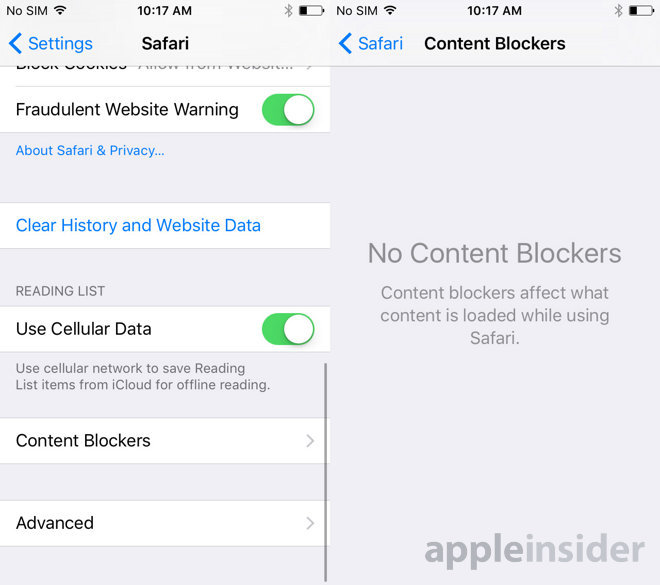Developers building apps for iOS 9 have access to an API that can block content like images, tracking cookies, and pop-up ads in Safari, potentially laying the groundwork for Apple-sanctioned ad blockers.
In particular, developers can create app extensions that supply a JSON file to Safari, which screens incoming Web content without feeding browsing history back to the extension. Xcode in fact includes a template for such extensions, only requiring developers to edit the JSON file to add triggers and actions.
In the iOS 9 developer beta, the Safari menu under Settings now has an option for enabling and disabling individual content blockers.
The change could potentially usher in a flood of apps blocking ads, cookies, or offensive content in iOS. While that might improve the popularity of Safari with parents, privacy advocates, or people who just want unencumbered browsing, it might also upset advertisers, who are increasingly dependent on mobile for revenue.
Since the content blockers only impact Safari however, they likely won't interfere with ad systems integrated into apps, such as Apple's own iAd.
Content blockers will also be available for Safari in OS X El Capitan. Both El Capitan and iOS 9 are scheduled to launch sometime this fall.
 Roger Fingas
Roger Fingas








 William Gallagher
William Gallagher
 Wesley Hilliard
Wesley Hilliard

 Christine McKee
Christine McKee
 Malcolm Owen
Malcolm Owen

 Andrew Orr
Andrew Orr





-m.jpg)




84 Comments
Wow, this has me really excited.
It's about time. I already use blockers but having them built-in will help with compatibility. While Apple's at it, I'd really like to see them push back on web sites that work without Flash on iOS yet continue to force the use of it on OSX. I know I can use the Develop menu and select which User Agent I want to use but this shouldn't be necessary. The web sites are satisfied with not using Flash on mobile devices, which probably outnumber desktop devices by a large margin, so why won't they just change everything to HTML5 and get rid of Flash?
Hallelujah!
It's about time. I already use blockers but having them built-in will help with compatibility.
While Apple's at it, I'd really like to see them push back on web sites that work without Flash on iOS yet continue to force the use of it on OSX. I know I can use the Develop menu and select which User Agent I want to use but this shouldn't be necessary. The web sites are satisfied with not using Flash on mobile devices, which probably outnumber desktop devices by a large margin, so why won't they just change everything to HTML5 and get rid of Flash?
I just uninstalled Flash. Systems are happier. If someone hasn't converted their media content to HTML5 by now I ignore them.
Hopefully this also permanently fixes the hijack that redirects you to the App Store without user interaction.
The change could potentially usher in a flood of apps blocking ads, cookies, or offensive content in iOS. While that might improve the popularity of Safari with parents, privacy advocates, or people who just want unencumbered browsing,
Sounds like a broken business model to me...